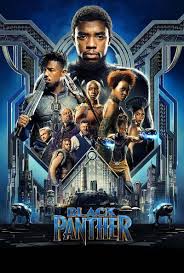
I’m going to get this out of the way immediately. I liked Black Panther, but I did not love it. I would rank it high in the Marvel pantheon but it was certainly not my favorite Marvel film. I’d have to digest it a little more, but my initial ranking would put it behind Iron Man, Guardians of the Galaxy, Captain America: Civil War, and Thor: Ragnarok. It does initially makes my top-5, but it is not number 1.
I saw the film on Presidents’ Day, and after sleeping on it and thinking about it, I’ve come to the following conclusions about the film. Like all of the Marvel films that came before it, it’s wildly entertaining with fun and energetic action sequences that build in intensity throughout the story. The story is structured well, and has a well-developed Hero’s Journey. It’s a professional, if unremarkably crafted story. The production design, art direction and VFX are what you would expect. They’re top-notch and, along with the action sequences, although they do sometimes combine make the film more “cartoony” than it ought to feel. But they create the eye-candy that draws the audiences to see the film.
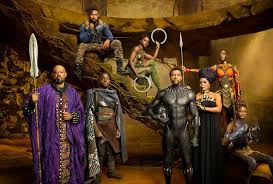
Another reason to see this film is the exceptional cast that director Ryan Coogler assembled. It’s a terrific mix of veteran heavy hitters (Angela Basset, Forest Whitaker, Martin Freeman) and the members of the newer generation that we’re sure to be watching for the next 30 years (Chadwick Boseman, Michael B. Jordan, Lupita Nyong’o, Danai Gurira, Daniel Kaluuya, etc.). The chemistry that was created in this cast served the film well and drew out performances that ranged from solid to excellent. For the most part, the acting wasn’t anything special in this film, but taken in their totality, all of the performances created a net positive impact on the film.
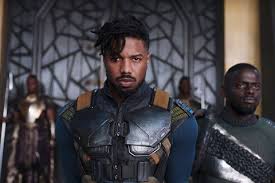
In particular, the performance of Michael B. Jordan as the prodigal Erik Killmonger, is an exceptional performance that needs special attention. His acting was not only exceptional, but brought a dynamic not previously seen in any Marvel film. His character had baggage. Now, many characters in the Marvel universe have baggage, but Killmonger’s baggage, though created through extraordinary circumstances, was baggage that made him relatable as a villain. This personal baggage made him who he is as a character and created in him the motivation that ultimately ends up driving the story. Coogler actually spent a solid amount of time giving us Killmonger’s backstory, and he presented it initially in small doses that teased us into wanting more and created tension and unease in how the story would progress.
His personal baggage also provided backbone to one of the primary thematic elements of the film, and that was the centuries-old struggle of African Americans for equality. Killmonger is a symptom in the disease that has afflicted that portion of the population, in that he grew up fatherless which embittered him as an adult. Adding to that bitterness was the conclusion that there were people who could have helped him and those like him, but did not. Unfortunately, Killmonger misunderstands his own strength. He used his bitterness to motivate himself to make something of himself, so that he didn’t need help from anyone else. He saw that there were others who got head starts, and he trained himself extra hard in order to make up the difference and ultimately pass those who started out ahead of him, and that’s one of the things that makes his story so tragic. Killmonger had the ability and strength to be anything that he wanted to be, but his bitterness and anger were weaknesses that he could not overcome. That makes Killmonger one of the deepest and most complex characters in the entire Marvel pantheon.
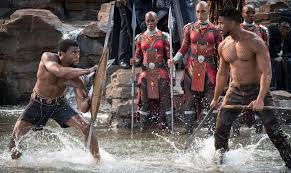
And now, here comes the “but”. My problem with Black Panther, and indeed many of the Marvel films, is that they’re wide, but they’re shallow. Whether it’s the directors of the films or the studio executives pulling the strings, there is always a lot of stuff crammed into each one of these films so we’re not able to dive into anything. There is very little depth in any Marvel film. Some of the Marvel films and characters like Captain America, David Banner/The Hulk, Peter Quill/Starlord, and Thor do have some depth. The surface is scratched a little deeper so that we as the audience are allowed some semblance of an emotional connection, but beyond that, there is very little in these films to become attached to. Marvel movies tend to be little more than eye-candy. I understand that the formula is working quite well for them, and that a lot of people continue to go and see their films and those films are practically printing their own money.
What the lack of depth will do, however, is it will cause many of these films go be forgotten over time. It’s already difficult to remember what events happened in which films. That’s a consequence of cramming so much material into each film. The films themselves become diluted. They’re as entertaining as they possibly can be, but stories are at their most effective when they evoke an emotional reaction from the viewer. I’ve watched many action films where I care about what happens and am emotionally affected by what happens in the story. I can think of a grand total of one time that happened in a Marvel movie, and it was in Black Panther and it was a scene with Killmonger.
Killmonger’s last scene, and in fact his last line of dialogue, give us such an emotional catharsis. I would love to see Marvel give us a film with half the characters of a typical Marvel film, and half to subplots, locations and action sequences. I would be happier to have fewer things to keep track of if it meant that we could take a deeper dive into what was left. That would be a lot more interesting and fewer components would also be a lot more memorable.
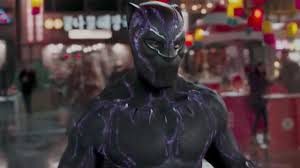
While not a perfect film, Black Panther should be applauded for attempting to do things that other Marvel films have not. Hopefully, the executives at Marvel and Disney will see that there is an appetite for thoughtfulness and emotions. I would tell them to give us more characters like Killmonger, who have the kind of depth that opens up thematic components to the stories and situations that will make us think and feel rather than just watch and react.